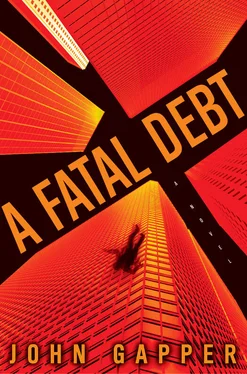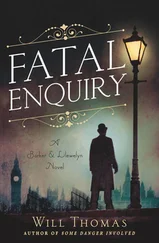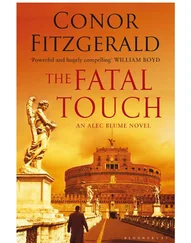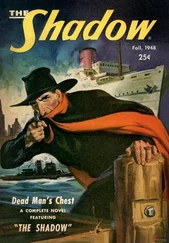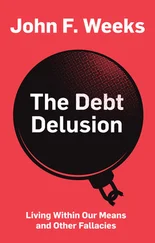John Gapper - A Fatal Debt
Здесь есть возможность читать онлайн «John Gapper - A Fatal Debt» весь текст электронной книги совершенно бесплатно (целиком полную версию без сокращений). В некоторых случаях можно слушать аудио, скачать через торрент в формате fb2 и присутствует краткое содержание. Жанр: Триллер, на английском языке. Описание произведения, (предисловие) а так же отзывы посетителей доступны на портале библиотеки ЛибКат.
- Название:A Fatal Debt
- Автор:
- Жанр:
- Год:неизвестен
- ISBN:нет данных
- Рейтинг книги:4 / 5. Голосов: 1
-
Избранное:Добавить в избранное
- Отзывы:
-
Ваша оценка:
- 80
- 1
- 2
- 3
- 4
- 5
A Fatal Debt: краткое содержание, описание и аннотация
Предлагаем к чтению аннотацию, описание, краткое содержание или предисловие (зависит от того, что написал сам автор книги «A Fatal Debt»). Если вы не нашли необходимую информацию о книге — напишите в комментариях, мы постараемся отыскать её.
A Fatal Debt — читать онлайн бесплатно полную книгу (весь текст) целиком
Ниже представлен текст книги, разбитый по страницам. Система сохранения места последней прочитанной страницы, позволяет с удобством читать онлайн бесплатно книгу «A Fatal Debt», без необходимости каждый раз заново искать на чём Вы остановились. Поставьте закладку, и сможете в любой момент перейти на страницу, на которой закончили чтение.
Интервал:
Закладка:
“Okay then,” Underwood said, looking around again with the air of a celebrity who attracts attention if he lingers too long. “Let’s go.”
We walked back over the road and through the doors into the Seligman lobby. It was marble-floored, with a wide desk facing the entrance, behind which a line of women in uniform was handing out visitors’ passes. Underwood ignored them and strode toward the barriers to one side, glaring at the guard who stepped forward to try to impede my progress. The man stepped back obediently and instead waved a card at a barrier, making it part for me.
I expected us to rise far up the tower, but Underwood stepped out of the elevator on the fourth floor, leading me through some glass doors with a swipe of his card. We stepped onto a trading floor, with long lines of desks covered in multiple screens stacked beside and on top of one another as if they’d been dividing and multiplying like cells.
I’d never been in such a place before, and I had always imagined it would be a hive of noisy activity, like those they show on television, with young men in bright jackets waving and calling to one another. Instead it had a detached air, like a station that was monitoring the action on some far-off planet. There must have been a thousand people on the floor and a few were typing on keyboards, but most seemed to be doing nothing. They leaned back in their seats, gazing half-attentively into the digital void or chatting to others nearby. None looked especially happy or sad, just intrigued by the numbers on the screens.
A woman in a suit like Lauren’s sat on a desk, talking with three men gathered by her. They all nodded deferentially at Underwood as he passed by, walking between lines of desks toward a corner of the floor. I walked beside him, seeing the tilt of heads as we passed. Everyone was sitting in plain view, with none of the usual trappings of status-individual offices with assistants-yet I knew that all of these people probably earned more than me.
As we reached the corner, Underwood led me into a glass box office with windows looking out over Broadway and panels giving onto the trading floor to the interior. A blind was pulled down one of the four panels, but the others remained open, so he could watch everything that was going on outside and those who were interested could observe us, like animals in a zoo. There were photographs of his family on one ledge, but the room was otherwise free of personal touches, as if he were a short-term tenant who might be evicted at any moment.
He waved me to an armchair on the side with a vista of the open floor. A woman walked in and gave him a pile of papers that he perused with a frown before handing it back. Then he came and sat by me, grinning.
“So, Ben. How can I help?” he said.
I didn’t like Underwood any more than the first time we’d met. He was like a primate in expensive clothes that might tear me limb from limb. He emanated barely contained aggression and contempt for the mortals who didn’t exist in his elite world of corporate wheeler-dealing. I wondered if it was an act to intimidate opponents or if he really was like that. There was something of that quality about the whole place. He was the leader now, but I could imagine a pack of those traders crashing through the door at his first sign of vulnerability.
“When we talked before, by the plane, I remember you saying it was Mr. Shapiro’s fault, everything that had happened to him, before Mr. Greene’s death. I wanted to know what you meant,” I said.
Underwood let out a breath and laughed flatly. “That’s a long time ago. I don’t know what I might or might not have said back then, when Marcus was still alive. I don’t remember you telling me much, Ben. Not even your name, as I recall.”
“I didn’t. Things were different then.” I didn’t see any reason to apologize for that, to him of all people. “Look. Mr. Underwood. John. Could I ask you something? How much do you know of my involvement?”
“I’ve seen the documents and I’ve talked to the Greene family. It’s not a happy story, is it? There are accusations against this bank as well as you, and I need to be careful what I say. I don’t know if we should be talking. Margaret is a good friend of my wife’s.”
I leaned forward in my seat. If I was to get anything from him, he had to believe I wasn’t a threat. Despite his familial references to the Greenes, I suspected that he didn’t care too much about them now that Marcus, his boss and patron-the man who could influence his career-was dead. I’d adapted my pitch from something Lauren had said.
“When we met before, Mr. Shapiro was my patient, as you know. I couldn’t say anything about him. You’ll understand that as a banker. You can’t talk about the clients you’re working for. I can’t tell you anything that was said to me in confidence, and I’m not asking you to do it either. But my career is in jeopardy and I’m trying to understand why Mr. Shapiro killed Mr. Greene. Can you help me?”
Underwood nodded as if I’d made some sense. “I would have thought that was obvious,” he said, wrinkling his nose. “The merger went wrong. Harry was unstable and blamed his own failure on Marcus. He shot him. End of story.”
“But why did it go wrong? That’s the part I don’t yet understand. I’m not a financier. All this”-I waved my hand at the glass panels giving onto the vast, hushed trading floor-“mystifies me. It’s your world.”
I wondered whether the flattery had been too obvious as Underwood gazed at me. But it turned out that Lauren had been right about something else: male investment bankers have big egos. He stood and beckoned to me.
“You want to know how Harry fucked up? I’ll show you,” he said.
Underwood and I left the elevator on the thirty-fifth floor. It led to a softly furnished lobby like an English drawing room, with a grandfather clock in a corner, its mechanical ticks echoing in the empty space. There was little sign of life, nobody sitting at the oak reception desk near the elevator. After the glass-and-steel floor, it felt as if I’d stepped into a Walt Disney version of the nineteenth century. There were no doors or electronic panels to impede us here, just a long, dimly lit corridor, visible through a mahogany arch. As we walked, I saw dark rectangles marked on the walls, each illuminated by a brass wall lamp.
“Harry kept the Old Masters from the art collection up here. They’re in storage now. I don’t want them,” Underwood said.
He opened a wooden door at the end of the hallway and led me into a small space, with two empty desks next to each other, then through another into an enormous office. It was a shock to enter after the gloomy hallway, for it was filled with light from two sides. It was on the corner of the building, facing south toward Times Square to one side and Rockefeller Center and the East River to the other.
I looked around the room. There was a wooden desk bearing two neat piles of paper and a computer with a twin screen. It was still blinking figures and graphs, although it looked as though it hadn’t been used for a long time. On the side by the hallway, there was a recessed alcove lined with books, like a kind of tiny library with a sofa and chairs, where the occupant had received guests. A Persian rug, an antique by the look of its muted threads, dominated the floor.
I walked behind the desk to look out at the room from that angle. Two framed photographs stood on the desk-one of a boy, a college student, perhaps, wearing the bulky pads and bright purple shirt of a hockey player. Other players had flanked him, you could see, but they had been cropped out to leave only his face, staring out cheerfully from under a helmet. The other was a portrait of Nora, looking happier than I’d known her.
Читать дальшеИнтервал:
Закладка:
Похожие книги на «A Fatal Debt»
Представляем Вашему вниманию похожие книги на «A Fatal Debt» списком для выбора. Мы отобрали схожую по названию и смыслу литературу в надежде предоставить читателям больше вариантов отыскать новые, интересные, ещё непрочитанные произведения.
Обсуждение, отзывы о книге «A Fatal Debt» и просто собственные мнения читателей. Оставьте ваши комментарии, напишите, что Вы думаете о произведении, его смысле или главных героях. Укажите что конкретно понравилось, а что нет, и почему Вы так считаете.
